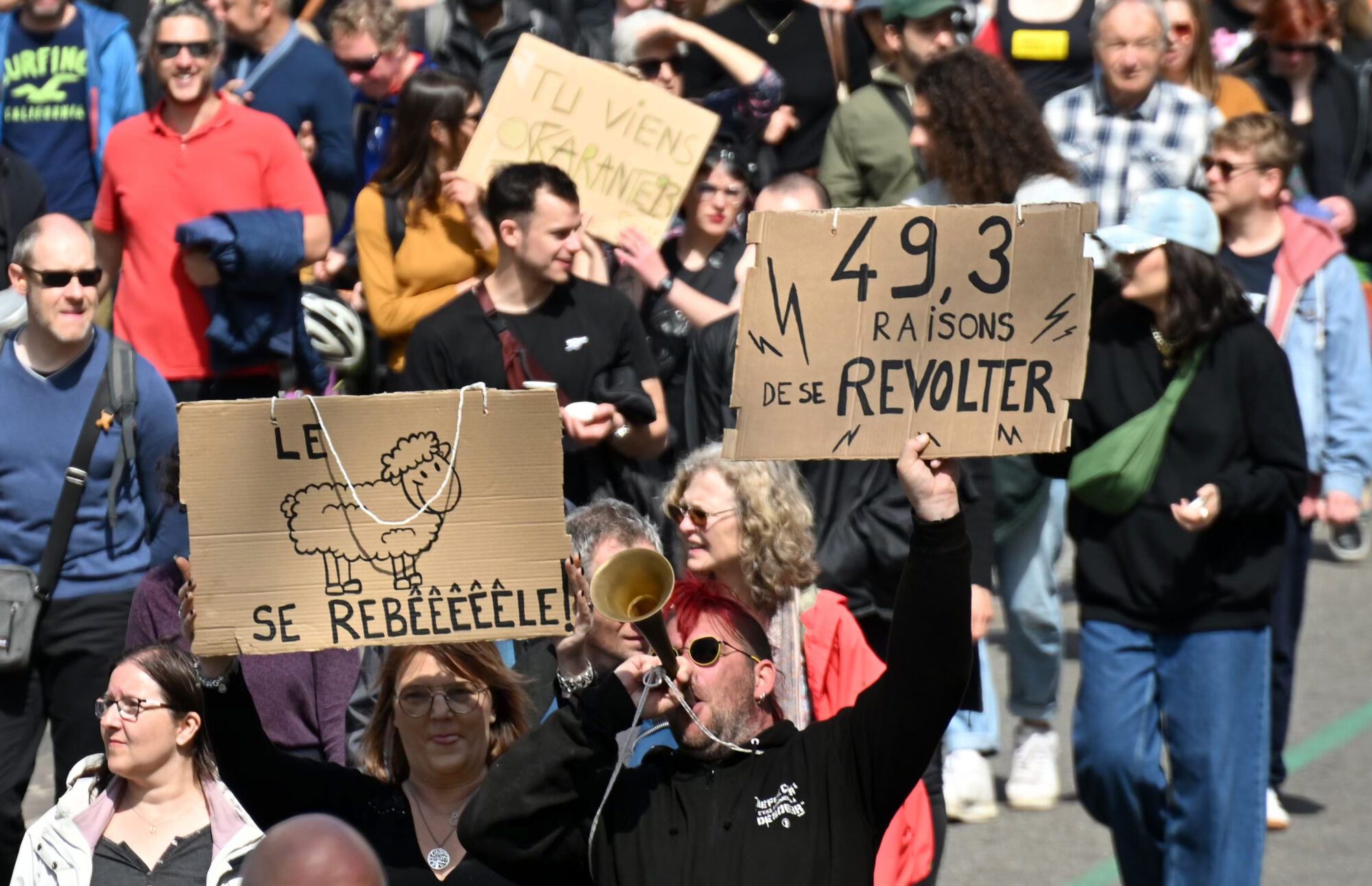
Protesters carry placards which read as (L) ‘the sheep are rebelling’ and (R) 49.3 reasons to revolt’ as they take part in a demonstration on May Day (Labour Day), to mark the international day of the workers, more than a month after the government pushed an unpopular pensions reform act through parliament, in Strasbourg, eastern France, on May 1, 2023.
FREDERICK FLORIN / AFP
The commemoration of Labour Day on May 1st was marked in France by a strong mobilisation as a continuation of the movement against the pension reform. Despite the passing of the law, the demonstrators were keen to keep up the pressure on the government to show their disapproval.
The tension was palpable already on the evening of Saturday, April 29th, during the final match of the French Football Cup between Nantes and Toulouse. Contrary to tradition, President Emmanuel Macron did not go down to the pitch of the Stade de France to greet the players for fear of booing, preferring to shake their hands in the dressing room away from the public. At forty-nine minutes and three seconds—in reference to article 49.3 of the Constitution—the stadium resounded with whistles and shouts, which could be heard on the amateur videos of the match that have since circulated on social media. The General Confederation of Labour (CGT) union had warned that the official broadcast might be censored to hide the signs of hostility shown to the president.
On Monday, May 1st, Labour Day was marked by very large processions of demonstrators throughout France. According to the newspaper Le Monde, the processions gathered seven to ten times more people than in 2022. The Ministry of the Interior counted 782,000 demonstrators in France, compared to 116,500 in 2022. The CGT union counted 2.3 million people in the processions.
Tensions on the margins of the demonstrations once again attracted thugs and ‘antifascists.’ The police union Alliance bemoaned an “apocalyptic” May Day, and Minister of the Interior Gérald Darmanin announced 540 arrests and 406 injured police officers. On Twitter, Prime Minister Élisabeth Borne praised the “responsible commitment” of some demonstrators but denounced the “unacceptable” violence that marked this May Day.
Dans de nombreuses villes de France, ce 1er mai a été un moment de mobilisation et d’engagement responsables. Les scènes de violence en marge des cortèges en sont d’autant plus inacceptables.
— Élisabeth BORNE (@Elisabeth_Borne) May 1, 2023
Soutien à nos forces de l’ordre.
For the demonstrators, the objective is still the same: the withdrawal of the pension reform. Some, like a nurse interviewed by Le Monde on the Place de la Nation in Paris, even expressed the wish that Emmanuel Macron would eventually “abdicate”—a monarchical-sounding term deliberately chosen by the president’s opponents who castigate his contempt for the people. According to the latest polls, the popularity rating of Emmanuel Macron and his Prime Minister Élisabeth Borne is at an all-time low. Emmanuel Macron has regained the level of distrust from public opinion that he enjoyed during the yellow vests crisis in the autumn of 2018.
The trade unions were keen to display their solidarity and common front of action. Laurent Berger, representative of the CFDT union, insisted to journalists: “we will be loyal to each other, we will not stop talking to each other.”
May Day is also traditionally the ‘Nation’s Day’ for the Rassemblement National, which gathered its activists in Le Havre—the city of former Prime Minister Edouard Philippe, presented by the press as the future opponent of the Rassemblement National for the presidential elections of 2027. The leader of the RN deputies Marine Le Pen closed the day with a speech in which she reminded the listeners that, according to her, there were only “three possible exits in a crisis: the dissolution of the Assembly, the referendum, or the resignation of the president.”
